 |
|
 |
2021
September
23
|
Halfway down the mountain
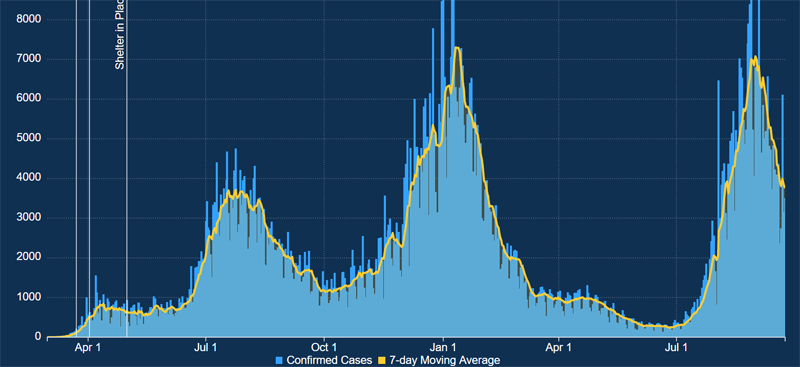
Georgia total cases (PCR and antigen) with 7-day moving average
The fourth wave of COVID has fallen to 55% of the case rate at which it peaked
on August 31. Since it won't go all the way to zero, we are effectively
halfway down the mountain.
The rest of the country is also past the peak, but not doing quite this well.
By the way, I trust Georgia's reports, especially since positivity is also falling,
showing we are doing enough testing.
This isn't Florida.
Some predict a fifth wave in the winter. Others think we are finally so close to herd
immunity that further waves will be shallow to nonexistent. Already, the fourth wave was populated
almost exclusively by unvaccinated people, but because the vaccine doesn't give me total
immunity, I have to take precautions when so many people around me are infected.
We have been living a secluded life. On top of COVID precautions, I've had bronchitis
since Labor Day and have been avoiding public places because my coughing wouldn't be welcome
there. (Today I'm finally a little better.)
Even without that, we're taking heavier-than-normal COVID precautions because we
want to go see the new baby in about a month.
Most public places went back to requiring, or strongly requesting, masks a few weeks ago.
Because of obstinate politicians, in a lot of places, including the campus, masks can't
actually be compulsory, and at UGA, only about 10% of students wear them, despite being
"strongly encouraged" to do so.
I know that because I was on campus today. For the first time in several weeks, I went
to the Science Library to return a book and look at some others, and also to take my
daily one-mile walk, which would otherwise be in the neighborhood.
The campus looked largely normal, though perhaps a bit less crowded than under
normal conditions.
It was good to see human beings as more than just words on a computer screen.
Little things like holding a door open for someone and receiving a smile are
important when you've been away from them for a long time.
Permanent link to this entry


|
2021
September
20
|
Fraternities and sororities
Some advice I injected into a conversation between undergraduates on Facebook.
Kappa Delta is the sorority they were already talking about, and I use it only as
an example — I don't have any detailed knowledge of it.
As an old retired professor I will just say this. Your diploma will not say Kappa Delta.
Your employers will not care about Kappa Delta.
Your diploma may say Magna Cum Laude and impress employers if you stay focused on why you are really here.
A university is not primarily a network of exclusive social clubs.
Join one if you want, but don’t imagine it marks you as anything more than just a member of a social club.
And I'll say something even grumpier.
My impression as both a student and as a professor was that fraternities and sororities
don't put people in the mainstream of university life. They keep them out of it.
They take up your money and time and keep you from doing other things.
My wife's best friend from elementary school
was at UGA the same time she was.
She was hoping to reconnect, but no — this girl was totally immersed in a sorority,
and in four years my wife never set eyes on her.
Most of you know that I also have moral qualms about exclusive social clubs that vote people
in or out. The boundaries of a circle of friends should always be fuzzy.
Permanent link to this entry


|
2021
September
19
|
A plethora of third-tier music
Further to what I said about
third-tier music
and exploring the huge collection of audio recordings Melody gave me,
I've come upon
Francis Pelletier's videos
of the top 100 (or sometimes 250) hits of every year.
While the top 40 songs of any particular week are mostly quite forgettable,
many of the top 100 of a whole year have enduring value, or at least are
memorable. They are excellent for recalling to memory the songs you heard
but then forgot about.
Here are my thoughts after listening through the 1970s:
- I noticed popular music the most in 1970, 1971, and 1972. That's when I
was in high school, and I heard the local top 40 station in the car with my
family, and also heard many of the best vocals on WSB-FM, which was piped into
Valdosta by the cable TV company, and favored instrumentals but not exclusively.
- I also think the hits of 1970-72 covered a wider variety of music than
later on, and more of the songs became classics.
(We're certainly still hearing them.)
Around 1973-75 the Top 100
shifted toward hard rock, then started to shift back. That is the time when
I was not listening to as much popular music (too busy with international travel,
college, etc.). But my impression on listening to those years just now is that
the music just wasn't as varied, nor as good.
- In the 1976-77 school year I had an FM radio in my car and heard a lot of
popular music. It was more varied than in 1973-75, but that doesn't mean I
liked it better. Instead of The Carpenters, etc., we got songs like
"Blinded by the Light" and "Afternoon Delight," both of which I can do without
for several more decades. (Can you imagine how embarrassing it could be if
"Afternoon Delight" came on the radio while one had a lady in the car? And from
mid-1976 on, I often did, namely Melody. I kept the radio turned off.)
- After 1977 I was away in graduate school and heard much less popular music,
but my impression is that a good many of the songs didn't deserve a lot of attention
anyway. Some did, of course; Dan Fogelberg came on the scene, and other good
performers, but "Top 40" or "Top 100" was a much less unified category than it
used to be, as popular music quite properly matured and split into more genres.
I do plan to listen through the 1970s again and make a playlist of songs I want
to hear again. There are quite a few.
Permanent link to this entry
Music 50 years ago:
When Ferrante and Teicher had a tiger by the tail
The twin pianos of Ferrante and Teicher were an important part of the instrumental
music scene in the 1960s and 1970s. Their performances ranged from sublime
("El Condor Pasa") to amusing
(Bach's "Minuet in G").
Most of their instrumentals were show tunes, and four times,
they made the U.S. Top 40, competing with rock-and-roll vocals.
One of those was a 1969 song called
"Midnight Cowboy,"
named after a movie with
the same title. It was extremely popular, as it should be — it's a good piece
of music.
Now for the tricky part. Most people who liked the song knew that it had to do with a
movie, but they didn't know much about the movie. Even when lyrics were added to the song later,
they only said something vague about a man's dashed hopes, nothing about how they got dashed.
In fact, Midnight Cowboy was an X-rated movie about a would-be male prostitute.
(Rated X for sexual topics, not for pornography.) I never saw it. Neither did anybody I knew,
although it did get critical acclaim and an Oscar.
As far as I can tell, the song was more popular than the movie, and that's the problem.
Ferrante and Teicher apparently realized that if the movie became better known, the song would
lose sales because most of their clean-living, conventional fans wouldn't want to support
an X-rated movie.
So their Midnight Cowboy album — although the title is prominent — makes no
explicit mention of the movie on its jacket. It has a picture that includes a man in a cowboy hat,
but you can't really tell what he's doing, and I have no idea if it's from the movie.
The tactic worked. Apparently, much of the public thought the movie was an obscure western.
That's certainly what I thought when I bought the album in ninth grade, and I didn't get any
flak for it. And I enjoyed the music, which is not corrupting in any way that I can tell.
This misconception was widespread enough, in fact, that I once heard "Midnight Cowboy" used as background
music for a narration about a little boy dreaming about cowboys. Cultural literacy check, anyone?
Permanent link to this entry


|
2021
September
18
|
Short notes
What I got for my birthday:
A new Carrier air conditioning system for the home office (upstairs).
It works exactly like the old one.
For security reasons I asked for a conventional thermostat, rather than the
one I was offered, which had voice recognition (a security hazard) and
Wi-Fi (another security hazard).

Farewell, old bank:
The place where I opened my first checking account (as a freshman in September 1973)
is no longer a bank. It actually closed in March, but I wasn't aware of it.
Founded as The National Bank of Athens (which, for my foreign readers, I should explain
means "Nationally chartered bank of Athens, Georgia"), it was First National Bank of Athens
by the time I met it. Later, through mergers, it became Trust Company Bank of Atlanta,
then SunTrust, and now Truist. This latest merger combines it with a BB&T bank just
down the street, and this is the one they chose to close.
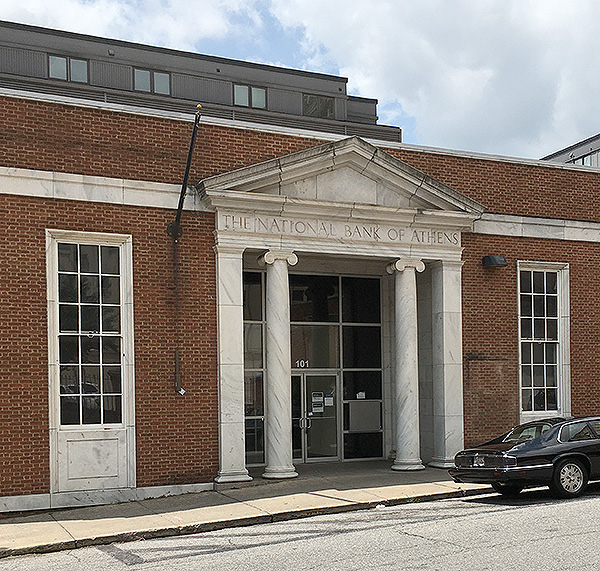
48 years:
This date in 1973 was the day I flew in from Rome, the last day of my trip around
the world. The next day was the first day of classes at UGA, perfectly timed.
More about that some other time.
Permanent link to this entry


|
2021
September
14
|
1000000 years old?

It's in binary numbers, of course. A computer geek only turns 64 once, and I
couldn't miss this opportunity...
Permanent link to this entry
Short notes
Stephen's birth announcement has been
updated and includes his picture.
For the past 8 days I've had bronchitis. I got a COVID test and it came back
negative, but I still cough too much to be welcome in most public places.
It also sapped my strength; I'm just now getting to where I can do a normal
amount of work from home. When I'll be back in the office, I don't know.
Permanent link to this entry


|
2021
September
11
|
An ancient Greco-Roman popular song?
Tim Whitmarsh, of Cambridge University, has done
an interesting study
of a short poem or song that was widely inscribed on jewelry in the second or third century
(see also this news release, with a picture).
We don't actually know if it was sung as a song, or just recited as a poem.
What's noteworthy is that it's the first known example of poetic meter as we now know it —
based on stressed syllables — just like modern English poems and songs.
All previous Greek and Latin poetry was based on syllable length.
Here's the text in Greek, with transcription into our alphabet, and my translation (not the same as the
one in the links). The mark ´ marks the stressed syllables:
| Λέγουσιν |
Légousin |
They say |
| ἃ θέλουσιν |
hà thélousin |
what they want. |
| λεγέτωσαν |
legétōsan |
Let them say it. |
| οὐ μέλι μοι |
ou méli moi |
It doesn't matter to me. |
| σὺ φίλι με |
sù phíli me |
You, kiss me. |
| συνφέρι σοι |
sunphéri soi |
It's good for you. |
You can probably imagine this printed on a T-shirt; Melody said she could
imagine it being sung by Britney Spears.
The next-to-last line can also be translated "love me." Three spellings, meli,
phili, and
sunpheri, reflect postclassical pronunciation (-i for -ei).
The n in sunpheri looks like a hypercorrection; classically, it began with sumph-,
which is almost certainly how the poet pronounced it, but maybe the poet or a scribe thought that
was a sloppy pronunciation and instead used the spelling of the words it is derived from.
Stress-based meter next turned up in early Christian hymns two or three centuries later.
It has long been thought that this must reflect the influence of popular poetry and music
rather than the classical tradition, but no one had seen the popular poems. Now we've caught one.
And I'll be tempted to sneak up on Melody and say, "σὺ φίλι με, συνφέρι σοι..."
Permanent link to this entry


|
2021
September
10
|
My true love gave me 8,700 songs
Some people have been serenaded. Many, including me, have been given phonograph records,
tapes, or CDs as birthday presents. But for an early birthday present this year, Melody has
outdone all of them. She has given me about 8,700 digitized songs, and, in case that's
too many to take on at once, a playlist of her 140 favorites among them.
What she did was put her personal collection of MP3s onto our shared server. Almost all of
them were ripped from CDs. If you buy two or three CDs a month for nearly 30 years, as we have
been doing, you end up with about a thousand CDs, and maybe twelve thousand songs. Melody has
been using a portable MP3 player for about 25 years and gradually ripping all the CDs into
computer files. A few of the 8,700 are purchased downloads, but not many.
The CD collection is diverse. Ever since her youth, Melody has been willing to buy an album
or CD for just one song on it, or sometimes part of a song — such as a guitar or
synthesizer section in a song she otherwise dislikes. She wants to listen to these out of
interest even if not enjoyment. And she has long been well aware of something I hadn't fully
realized until recently — a band's or singer's best songs are very often not the
most popular. A band's "hits" are usually the most distinctive-sounding songs, not the finest.
Sometimes the best music comes out when the musicians hastily do something they enjoy,
to fill out an album, rather than something calculated to please the public.
Some of these pieces are never on the radio; you discover them by buying the album.
Melody is also very much not a "fan." She likes songs, not performers. Sometimes she likes a
lot of songs from the same performer. But personal admiration of the performer doesn't enter
into it (except maybe for the late Dan Fogelberg, who was consistently good).
She is quick to acknowledge faults in even her favorite performers' performances,
and certainly in their personal lives.
And above all, she looks at rock music from outside, as music
to be listened to critically, not as a cultural movement to join, nor even a fashion
to conform to.
Back in June I wrote about music that Melody
introduced me to, and how her knowledge of 1970s popular music (especially the "soft rock"
genre) is much more encyclopedic than mine.
Besides the factors I pointed out then — our different approaches, and the fact that I
got deeply into classical music earlier — I've realized there's a much more superficial
factor: Radio stations.
Melody grew up in the Atlanta area, with its wealth of good radio stations trying to serve audiences with
a genuine interest in music. I was a teenager in Valdosta, which had four AM stations, only one
of which played rock, and it was strictly Top 40 (or less than 40) for high schoolers. Then, when I came to
Athens, for the first 3 years I didn't have an FM radio in the car, nor even a good FM radio at
home (nor, in those days, was there good reception of Atlanta from Athens),
so the wealth of Atlanta was still unavailable, and, with many other things competing for
my attention, I just didn't listen to popular music. That's why Melody discovered Loggins and
Messina and other 1970s singers and I didn't. I do recall getting
an inkling of what I was missing during
an early 1973 trip to Macon, where I discovered a soft rock station unlike anything Valdosta had.
But I had so much else going on that summer that I didn't pursue it.
Now she's sharing the wealth with me. So, if you'll excuse me, I have 8,700 songs to listen to...
Seriously, I made CDs (of data files) of Melody's top 140 favorites, and in the car, they are like
having a customized soft rock radio station. Since these playlists are Melody's own — made
for her own use, not to predict what I would like — they are also a way of getting to know
her even more deeply.
Permanent link to this entry


|
2021
September
8
|
Past the fourth peak?
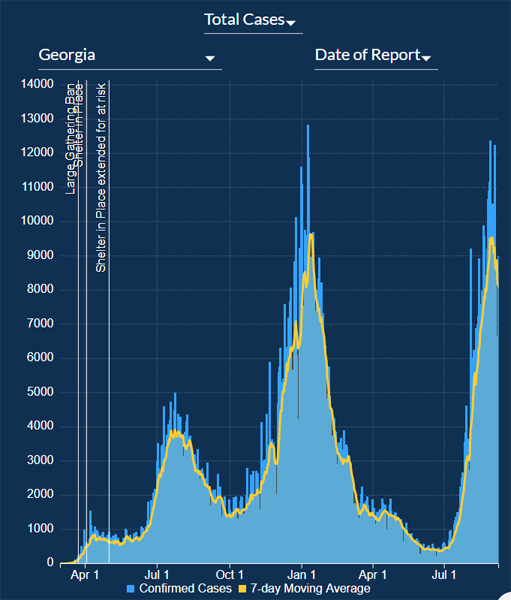
I note this step in our ongoing war with COVID, a war too many Americans don't
want to win, because it is "their right" to refuse masks and vaccination, and
"their right" is more valuable to them than other people's lives.
The fourth peak, possibly ending now, is composed almost entirely of unvaccinated
people. But because the delta variant of the virus is so contagious, and because
the vaccine reduces the risk of symptomatic infection by only a factor of 8 or so,
even we fully vaccinated people have to take heavy precautions while the overall infection
rate is so high.
COVID is going to persist until everybody is immune to it, or dead. Some are
actually saying that old, weak, and handicapped people should be allowed to die off —
that it's better for the rest of the population. I am aghast.
I also note that lots of people refuse vaccination because they don't trust modern
medicine. But where do they go when they get sick? To a hospital, not a Facebook
comment page. Go figure.
Permanent link to this entry


|
2021
September
6
|
How to get rid of mosquitoes
The last couple of times I've had the telescope out, my yard has been surprisingly
devoid of mosquitoes. The cooler temperature may have something to do with it, as
well as switching from permethrin to bifenthrin for regular sprayings. But I think
I know who deserves most of the credit:
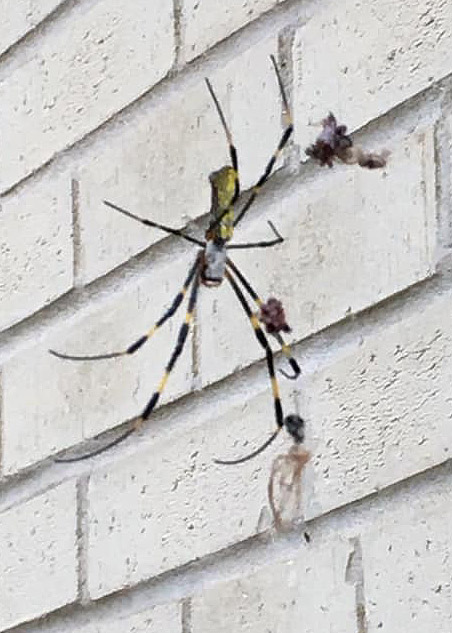
Right now I have a remarkable infestation of Joro spiders, with maybe ten or twenty webs
visible in my yard, and one to five spiders in each web.
As long as these creatures are willing to trap and eat mosquitoes for me, I'll let them!
Unlike the mosquitoes, the Joro spiders don't voluntarily bite humans (though I'm told
they can be provoked). And unlike the local orb-weavers, they build complex, multi-layer
webs rather than single layers. Those mosquitoes don't stand a chance!
Athens is near ground zero of the North American infestation of Joro spiders.
The first one was found a few years ago in Hoschton,
about 25 miles west-northwest of me [corrected].
(Details here.)
Permanent link to this entry


|
2021
September
5
|
More photography together
The picture of the Watson Mill shoals that I posted yesterday
(click here to jump to it)
was very well received on Facebook, and we realized it's an example
of something Melody and I have been doing ever since our trip to Braselton
when she was 17: collaborating on photographs.
So we've decided to do a lot more of it!
Toward that end we drove around the south side of Athens yesterday evening.
We set out to look at Athens' Civil War monument, which has been moved from
downtown to an actual Civil War battlefield, with slightly amusing results.
It sits right in the middle of what used to be Timothy Road and is now a short stub
left over from construction of the South Bypass, in a spot that
I drove over every time I went to work
in the late 1980s.

Construction of the site is obviously not finished, and we
did not get a memorable picture of the monument itself,
but I did see a sumac plant:

This one was basically a solo effort by me, using our Nikon D5300.
Then we drove around to find a good place to photograph the sunset, and Melody took the picture,
and I then edited it:
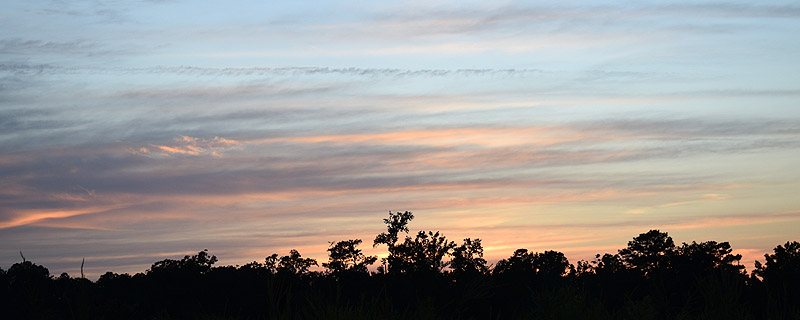
That's our haul from yesterday. We want to do this every few days.
Permanent link to this entry


|
2021
September
3
|
Watson Mill Bridge in 2021
For Stephen Barrett's birth announcement, which may be
updated with additional information, click here.
Last Sunday (August 29), Melody and I went for a drive in Sharon's car to try out the new speakers
I had put in, and before it was over we had wandered as far as
Watson Mill Bridge State Park (click here for
pictures from our 1979 visit).
We didn't bring a DSLR, but I took a few pictures with my iPhone, the last two of which were
"creative-directed" (planned and composed) by Melody. Here they are:
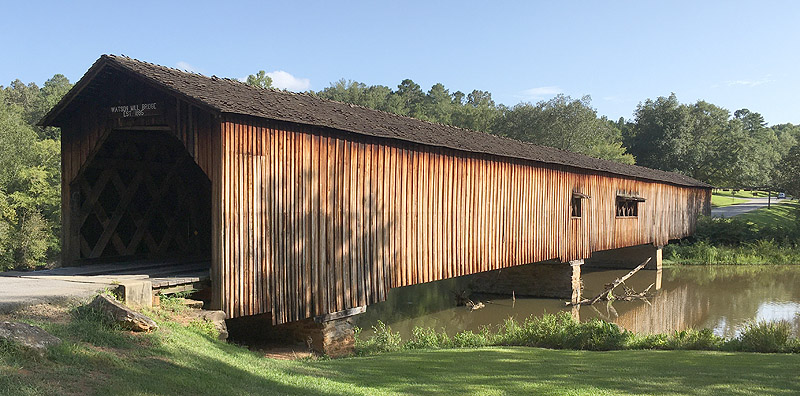
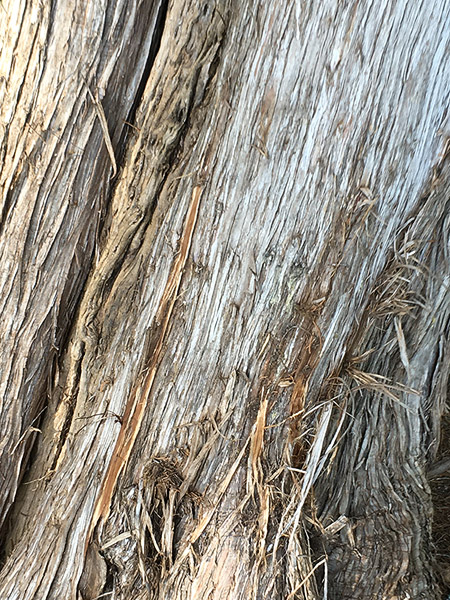
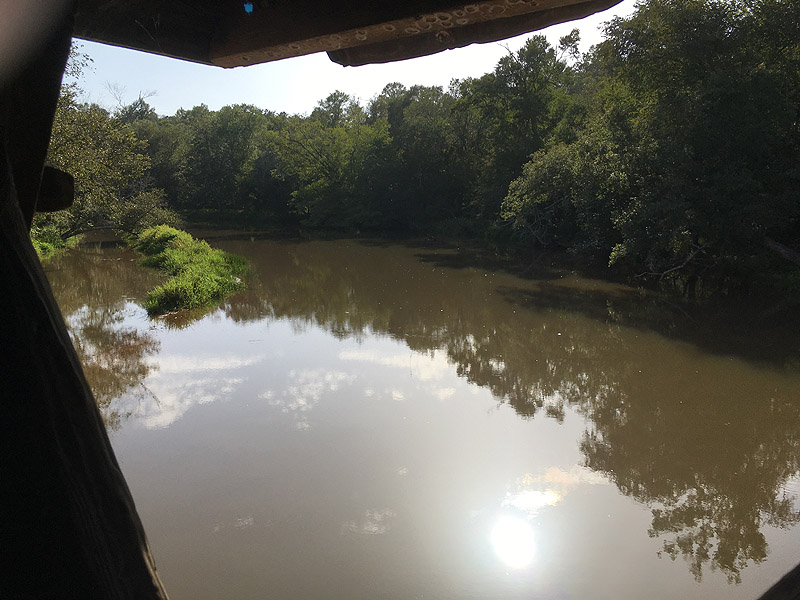


Permanent link to this entry


|
|
|
This is a private web page,
not hosted or sponsored by the University of Georgia.
Copyright 2021 Michael A. Covington.
Caching by search engines is permitted.
To go to the latest entry every day, bookmark
http://www.covingtoninnovations.com/michael/blog/Default.asp
and if you get the previous month, tell your browser to refresh.
Portrait at top of page by Sharon Covington.
This web site has never collected personal information
and is not affected by GDPR.
Google Ads may use cookies to manage the rotation of ads,
but those cookies are not made available to Covington Innovations.
No personal information is collected or stored by Covington Innovations, and never has been.
This web site is based and served entirely in the United States.
In compliance with U.S. FTC guidelines,
I am glad to point out that unless explicitly
indicated, I do not receive substantial payments, free merchandise, or other remuneration
for reviewing or mentioning products on this web site.
Any remuneration valued at more than about $10 will always be mentioned here,
and in any case my writing about products and dealers is always truthful.
Reviewed
products are usually things I purchased for my own use, or occasionally items
lent to me briefly by manufacturers and described as such.
I am no longer an Amazon Associate, and links to Amazon
no longer pay me a commission for purchases,
even if they still have my code in them.
|
|

















